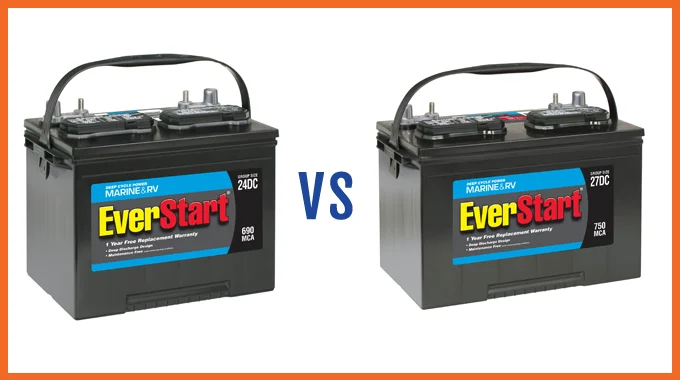Last Updated on May 1, 2023
When selecting a reliable RV battery, you may wonder whether to purchase a Group 24 or Group 27 model. Although both of these products are popular, you should be aware of some key differences before deciding.
RV batteries provide power for RV devices that make life on the road more comfortable, but not all batteries are the same. Most RV battery packs typically consist of three or four 12-volt batteries connected in series.
Both batteries are designed for deep-cycle use, meaning they can be regularly discharged and recharged without damaging the battery. To understand the difference between the RV battery group 24 vs 27 and decide which is right for you, let’s discuss the differences between the two.
RV Battery Group 24 VS 27 : Why they are Different
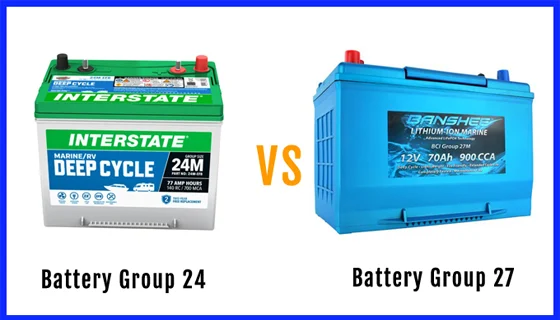
Group 24 and Group 27 RV batteries are deep-cycle batteries designed for RVs, but if you are in the market for a new battery for your RV, you might wonder what the differences are. There are a few key differences to keep in mind, such:
Battery Dimensions
When shopping for an RV battery, you will likely come across two different sizes: group 24 and group 27. So, what is the difference between these two battery sizes?
There is no difference in the width and height of group 24 and 27 batteries. There is only a difference in their length. A Group 24 battery is about 10.25 inches or 26 cm long, while a Group 27 battery is approximately 12.06 inches or 30.6 cm long.
This may not seem like a big difference, but it can make a big difference in storage space. So, group 24 batteries might be the better option if you are short on space.
Battery Weight
Group 24 batteries are generally lighter, making them a good choice for RVs frequently on the move. A group 24 battery tends to weigh between 22 lbs. to 57 lbs (10-25 kg), whereas a group 27 battery weighs approximately 57 lbs. to 70 lbs (25-32 kg).
Group 27 batteries are heavier and may not be as easy to move around, but they will typically perform better. Ultimately, the best RV battery depends on your individual needs and preferences.
Battery Capacity (AMP hour)
Group 24 batteries have a capacity of around 75-85 amp hours, while Group 27 batteries are capable of approximately 66-110 amp-hours in 20h capacity. This means that all else being equal, a Group 27 battery will provide more power than a Group 24 battery.
This means that when it comes to long run times, Group 27 batteries are the way to go. With a higher capacity, they will be able to power your RV for longer before needing to be recharged.
Reserve Capacity (RC)
Reserve capacity is the amount of time the battery can continue to provide power if the alternator fails or the engine is turned off. Group 24 batteries typically have a reserve capacity of around 120-180 minutes, while Group 27 batteries can last for 140-220 minutes.
Thus, if you are planning on spending extended periods without access to charging, a Group 27 battery may be the most suitable choice. Yet it is essential to note that both batteries require regular maintenance to stay in good condition.
Cold Cranking Amp (CCA)
The Cold Cranking Amps (CCA) measure a battery’s ability to start an engine in cold weather. Group 24 batteries have a higher CCA (500-840 Amps) than Group 27 batteries (600-1000 Amps), making them better suited for RVs in colder climates. This makes Group 27 batteries better for RVs in colder climates.
Cost-Effectiveness
Group 24 batteries are typically more affordable but don’t offer as much power as Group 27 batteries. On the other hand, Group 27 batteries are more expensive, but they provide more energy and a longer lifespan.
So, which type of battery is more cost-effective? It depends on your specific needs and situation. If you’re looking for an affordable option that still provides a decent amount of power, go with a Group 24 battery.
But, for a powerful battery that will last a long time, you’ll want to invest in a Group 27 battery. No matter which type of battery you choose, be sure to research to find the best possible option for your needs.
These are the key differences between RV batteries Group 24 and 27. Now that you know more about them, you can make a more informed decision about which one is right for your RV.
Importance of Knowing the Group for RV Batteries
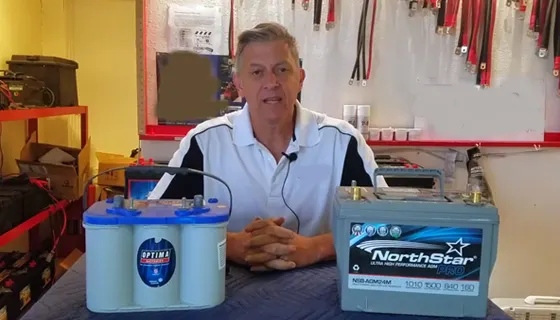
RV batteries come in a few different groups, and knowing which group you need is essential because it will determine how long your RV can run off of the battery without being recharged. Here are some reasons you must need to know about battery group:
01. What to Buy?
Different types of batteries are better suited for different RVs, and it’s necessary to choose the correct battery for your needs. Knowing the group size when shopping for replacement batteries is important because the particular group will determine the battery’s dimensions, terminal locations, and capacity.
In addition, the group will also dictate which accessories, such as a battery charger and inverter, are compatible with the battery. For example, a Group 24 true deep cycle battery is a common battery size for RVs. These batteries are often used with solar panels and wind turbines to provide power for onboard electronics.
02. How to Care for It?
If you don’t take the time to learn about each RV battery group and what to do with them, you could end up stranded in the middle of nowhere with a dead battery. That’s why it’s helpful to know the group for RV batteries.
Also, understanding the battery group will help you troubleshoot any issues with it. For example, if your RV’s battery isn’t holding a charge, you’ll know to check the voltage and see if the cells are equalized.
03. Battery lifespan
The lifespan of a battery is determined by the number of times it can be discharged and recharged before it needs to be replaced. Different battery types have different lifespans, so choosing the right kind of battery for the job is vital.
If you have deep knowledge about battery groups for RV, you can easily choose the best one that meets your needs and also has a long lifespan.
04. How to Charge It?
RV batteries can be expensive, and it is important to know how to charge them correctly to get the most out of them. Many RVers mistake hooking up their batteries directly to a generator or solar panel. However, this can shorten the battery’s life by causing it to overcharge.
So you should know the RV batteries group when you are planning to charge it. By doing this, you can ensure that your battery will last longer and perform better.
Benefits of Each Type RV Battery : Group 24 and 27
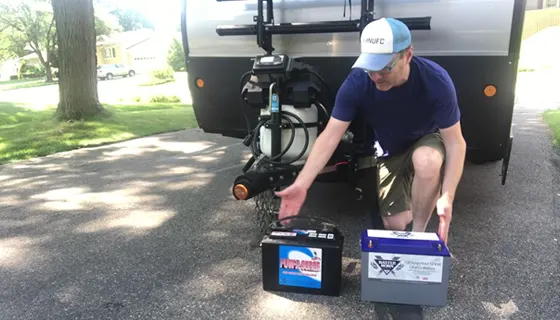
When choosing a deep cycle RV battery, selecting the right group size for your needs is important. Here is a breakdown of the features and benefits of an RV battery:
Group 24 Batteries:
- One of the main benefits of Group 24 batteries is finding replacement parts easier. Since they are so popular, most auto parts stores carry them.
- Using a Group 24 battery is more affordable than some other alternatives. If you desire a battery that is affordable and will still provide reliable power for your RV, a Group 24 battery is a viable choice.
- This is a general-purpose battery suitable for a variety of applications. These batteries are commonly used for deep cycle and standby purposes.
- It is also worth mentioning that the batteries are quite light, allowing them to be easily transported and installed. Their size is also compatible with most vehicles.
Group 27 Batteries:
- Group 27 batteries are some of the most popular on the market because they offer an outstanding combination of power, durability, and affordability.
- Preferred by RVers for their high capacity and deep discharge capabilities, Group 27 batteries are also an excellent choice for solar energy systems and other backup power applications.
- And with a long shelf battery life and low self-discharge rate, Group 27 batteries are designed to provide reliable performance yearly.
- The reverse capacity (RC) of group 27 batteries is one of the main reasons they are so popular. This means you can use more stored energy before recharging the battery, making them ideal for extended trips or power outages.
- These batteries are also very versatile and can be used in various applications, including deep cycle batteries, starting and standby purposes.
Advantages of a Group 27 Battery Over a Group 24 Battery
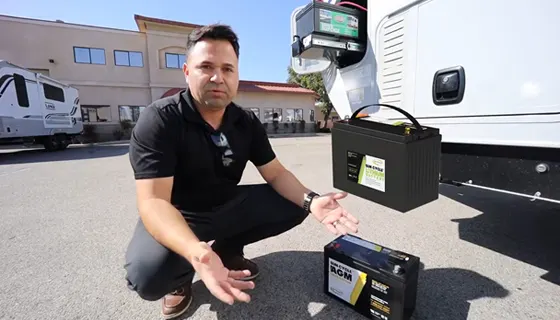
A group 27 battery is a lead acid battery often used in RV applications. Unlike a group 24 battery, a group 27 battery has more capacity and can provide more power. As a result, it is often the preferred choice for high-powered applications such as trolling motors.
Also, a group 27 battery is less likely to leak acid than a group 24 battery. Consequently, this product is helpful in RVs where spills are more difficult to clean up. While a group 27 battery is typically more expensive than a group 24 battery, the increased power and safety that the battery provides may be worth the extra cost.
They also tend to be more durable and resistant to vibration, making them ideal for use in RVs. Group 27 batteries are often more durable and require less maintenance. This makes them a popular choice among full-time RVers who don’t want to worry about their batteries failing on the road.
FAQs
Some of the most common questions about the RV batteries group are listed below:
Q: What Size Is a Standard RV Battery?
A group 24 battery is the most common size of RV battery. These batteries are usually found in RVs that have a single battery system. They are also commonly used in boats and other small vehicles. The main advantage of group 24 batteries is that they are small and lightweight, making them easy to transport and install.
Q: What Does Group Size 27 Mean on an RV Battery?
Group size 27 batteries are large and powerful RV batteries. They’re often used in applications where a lot of power is needed, such as electric vehicles and energy storage systems. Many group size 27 RV batteries are sealed lead acid batteries (SLA), which means they’re designed to be maintenance-free and have a long lifespan.
Q: What Does Group 24 On An RV Battery Mean?
Group 24 batteries are the most common type of battery found in RVs and campers. They are a 12-volt battery. These batteries are deep-cycle batteries. This means they are designed to be discharged and then recharged many times. They are also used in golf cart batteries, electric wheelchairs, and uninterruptible power supplies.
Q: Are Group 24 And Group 27 Batteries the Same Size?
There is a very slight difference in size between Group 24 and 27 batteries, but for the most part, they are interchangeable. The main difference is that Group 27 batteries are slightly lengthier than Group 24 batteries. So if you have a battery compartment designed explicitly for Group 24 batteries, you may find that it doesn’t quite fit a Group 27 battery.
Q: Can I Put a Group 27 Battery on My RV?
Yes, you can. Make sure the battery is suitable for the electrical setup in your RV. Most RVs have a 12-volt DC electrical system, so a group 27 battery should work fine. Consult your RV owner’s manual or a certified technician.
Conclusion
The RV Battery Group 24 vs 27 debate often comes up among campers and full-time RVers. Both types of batteries have their advantages, but ultimately, it comes down to personal preference.
If you need a lot of power for your applications, then a group 27 battery is the preferred option. Alternatively, a group 24 battery might be a better choice if you search for a smaller, lighter battery. Whichever battery you choose, ensure it is compatible with your RV’s electrical system.
We hope this article has helped answer some of your questions about the different types of RV batteries.
